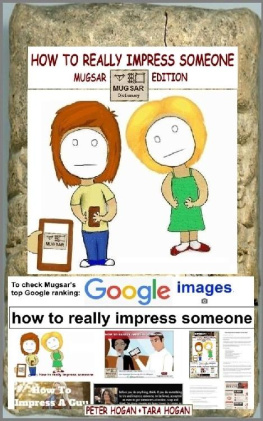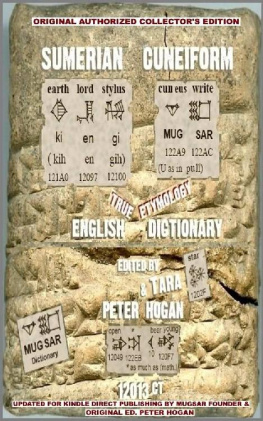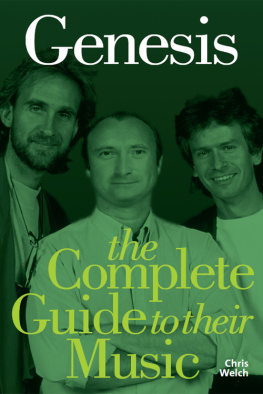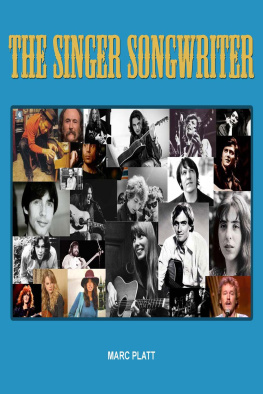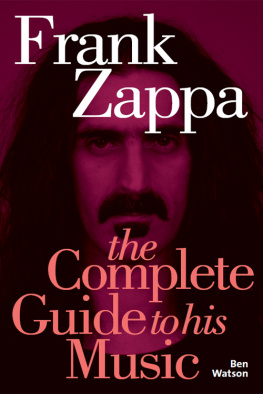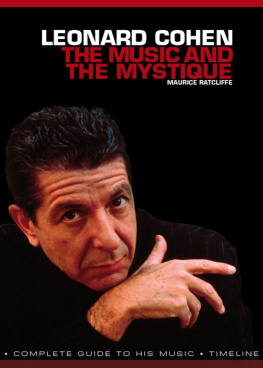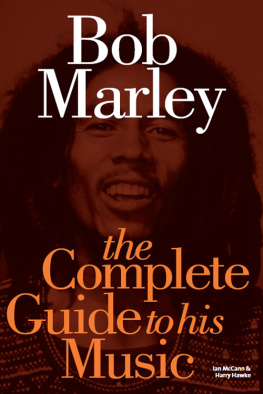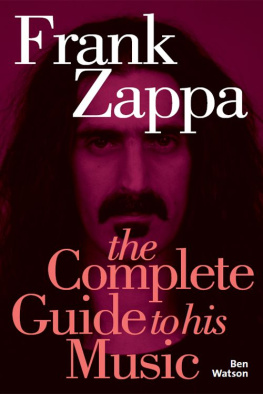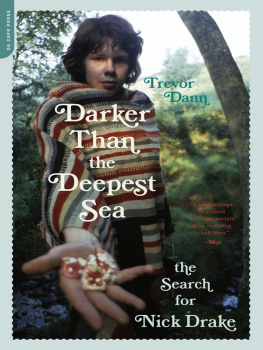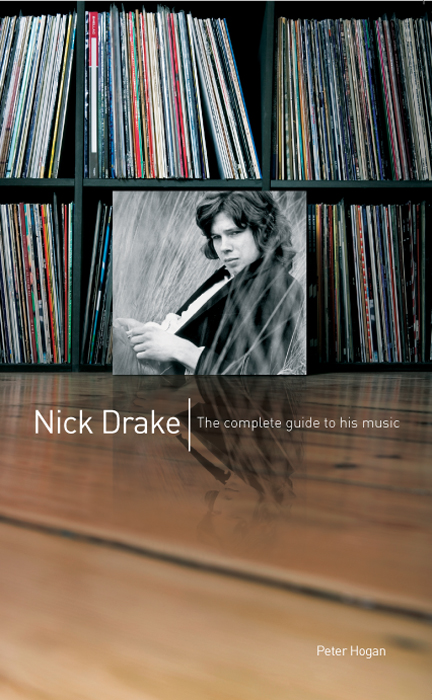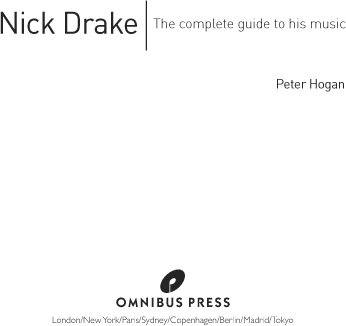The Author hereby asserts his / her right to be identified as the author of this work in accordance with Sections 77 to 78 of the Copyright, Designs and Patents Act 1988.
All rights reserved. No part of this book may be reproduced in any form or by any electronic or mechanical means, including information storage and retrieval systems, without permission in writing from the publisher, except by a reviewer who may quote brief passages.
Every effort has been made to trace the copyright holders of the photographs in this book, but one or two were unreachable. We would be grateful if the photographers concerned would contact us.
A catalogue record of this book is available from the British Library.
For all your musical needs including instruments, sheet music and accessories, visit www.musicroom.com
For on-demand sheet music straight to your home printer, visit www.sheetmusicdirect.com
Introduction
I: Fame Is But A Fruit Tree
N ick Drake made just three albums before his death at the age of 26 in 1974. At that point, his total record sales were a mere 20,000. In all probability, even fewer people than that ever saw him play live. He only ever gave one press interview. There is no film footage of him after his childhood, and comparatively few photographs; these show a tall, elegant young man with a slight stoop and elfin good looks.
During his lifetime, most people discovered Nick Drake either by total accident, as I did (through hearing Time Has Told Me on the 1969 Island sampler Nice Enough To Eat), or else by word of mouth recommendation. As the decades passed, that word of mouth accelerated and snowballed to the point that snatches of Nicks music now seem to follow you wherever you go; as his one-time collaborator John Cale put it recently, every time I go to Starbucks I hear it. His reputation had been enhanced by three posthumous collections of unreleased material, and also by as many best of compilations. Over the last ten years or so Nicks music has appeared on the soundtracks of at least one TV commercial and at least five movies. Hes been the subject of two substantial biographies (by Patrick Humphries and Trevor Dann) and a number of TV and radio documentaries; theres talk of an official biography in the works, and even the possibility of a film version of his life. Numerous websites and message boards are devoted to exhaustively analysing his life and music, and both his grave in Tanworth-in-Arden and his old family home Far Leys nearby, have become sites of pilgrimage for a steady trickle of devoted fans.
Since Nicks death his work has been praised by (among others) Elton John, Peter Buck, Robyn Hitchcock, Tom Verlaine, Paul Weller, the Dream Academys Nick Laird-Clowes, The Thes Matt Johnson, Clive Gregson, Elvis Costello, the Red Hot Chili Peppers, Kate Bush, Mark Eitzel, Belle & Sebastian, the Cardigans, the Black Crowes, Stephen Duffy and Everything But The Girls Ben Watt. Hollywood icons Brad Pitt and Jennifer Aniston had Nicks music played at their wedding (Pitt went on to narrate a BBC radio documentary about the singer, and was rumoured to have even considered playing him in a biopic). Both Joe Boyd and Robert Kirby have been sought out by numerous other artists keen to work with them after hearing their work with Nick. Hes also inspired a number of songs by other artists, most of whom knew him personally: Robin Fredericks Sandy Grey (recorded by John Martyn on London Conversation), John Martyns Solid Air, Richard Thompsons The Poor Boy Is Taken Away, Ashley Hutchings Given Time and Robyn Hitchcocks I Saw Nick Drake.
Today, Nicks music has reached an incredibly broad audience, of all ages and tribes. So whats at the heart of his appeal? His death is certainly a part of it, if only because hes frozen forever in youth; his good looks will never be ravaged by age, his music will never decline. With the distance of time, Nicks essential shyness has become transformed into enigmatic charisma, his sad fate now an integral extension of his romantic music. But ultimately, its the music that counts. During the late sixties Nick was just one of many English singer-songwriters spinning out of the folk clubs - a group that included Ralph McTell, John Martyn, Al Stewart, Roy Harper and many others - and it was inevitable that hed be bracketed alongside them; but time has proved that Nick was far more talented than any of his contemporaries. He was possessed of a pure, English singing voice - something that was still rare (if not unique) at the time - with a vocal style that was all his own. Instrumentally, as Joe Boyd has pointed out, Nicks guitar playing seems at first hearing to be quite straightforward and simple; its only when you pay close attention that you realise how subtle and involved it really is. Nick employed open guitar tunings that were incredibly complex; numerous guitarists have since been completely baffled as to exactly how Nick did what he did, the tunings being impossible to figure out from simply listening to records. In addition, Nicks picking style came from the fact that he was steeped in 12-bar blues and there are other influences audible as well that are not usually found in folk music, such as modern jazz and baroque classical music (Nick was particularly fond of Delius and Chopin). He could play a number of instruments, could read and write music, and had very broad musical tastes. Lyrically, his songs are noticeably more literate and intelligent than those of most songwriters of his time, perhaps because none of them had studied literature at Cambridge, as Nick had done.
His music has frequently been called timeless, and its often commented that it could have been recorded yesterday. This may be because it wasnt popular in its own time, and thus has no associations with that era. Secondly, although much of the ground that Nick covered was highly personal, it remained free of the confessional self-indulgence common to many other singer-songwriters of his time. Finally, at least some of the time Nick was attempting to convey - without the clichs of the sixties - a sense of wonder and a sense of magic; much of his early work concerns nature, and mans place in it, while his later songs concern how city life affects us, how it can distance us from the things that really matter. These are themes that are not confined to any era in particular; one might almost call them eternal truths.
II: Know
N ick Drakes work is inevitably overshadowed by the illness of his later years, and the nature of his death. Despite the official verdict of suicide, its equally possible that the overdose of antidepressants that killed him was simply taken accidentally. Either way, his death remains a tragedy -and one thats easy to romanticise. The central mysteries of Nicks life and death will never be solved, but its both inevitable and understandable that many of his fans have chosen to project their own pet theories and fantasies upon his story.
Given that Nick barely spoke to his friends or family - let alone the press - about his work or his life, were left with only his songs as a source for possibly understanding what he might have thought about the world. There are many who find Nicks music sad and/or depressing (though I am not one of them); these are perhaps the same people who -knowing that Nick had read both Camus and Sartre - conclude that his world view was an existentialist one. This is simply not true. Admittedly, much of Nicks later work deals with alienation and isolation, but even


